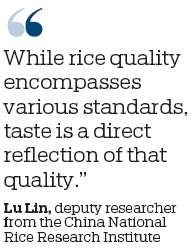Taste of Chinese rice improving, study says

The taste of Chinese rice has steadily improved over the past decade, according to a study published as a correspondence letter in Nature.
Researchers from the China National Rice Research Institute analyzed data collected since 2009, citing genetic improvements in breeding and optimized field management as key factors in the enhanced flavor.
Lu Lin, the study's lead author and a deputy researcher at the institute, explained that rice quality is judged based on appearance, odor, palatability, taste and texture when it's cold, according to a national standard introduced in 2008.
Using these criteria, the average taste score of Chinese rice rose from 74.9 in 2009 to a peak of 80.3 in 2022, reflecting significant progress in quality improvement.
"While rice quality encompasses various standards, taste is a direct reflection of that quality," Lu said. "This steady rise in scores shows China's advances in rice quality over the years."
The number of samples analyzed has also increased significantly, from hundreds in 2009 to between 2,000 and 3,000 annually in recent years. The study noted that while japonica rice initially outperformed indica rice in taste, indica rice has shown greater improvement over time.
They also observed a correlation between the improved taste scores and an increase in the total factor productivity of rice, suggesting a link between better rice quality and regional economic development.
"Previously, the global perception of Chinese rice flavor was unclear," Lu said. "These findings not only highlight the progress made in Chinese rice quality, but also provide a sense of recognition and encouragement for the future."
Li Shangyi contributed to this story.
Today's Top News
- US smearing of Hong Kong's business climate nothing but politically motivated bad-mouthing: China Daily editorial
- Xi calls on religions in China to adapt to Chinese context
- 20th CPC Central Committee to hold fourth plenary session from Oct 20 to 23
- China's vision on governance hailed globally
- Rebound in industrial profits signals stabilization of economy
- Instant consumption revitalizes market






























